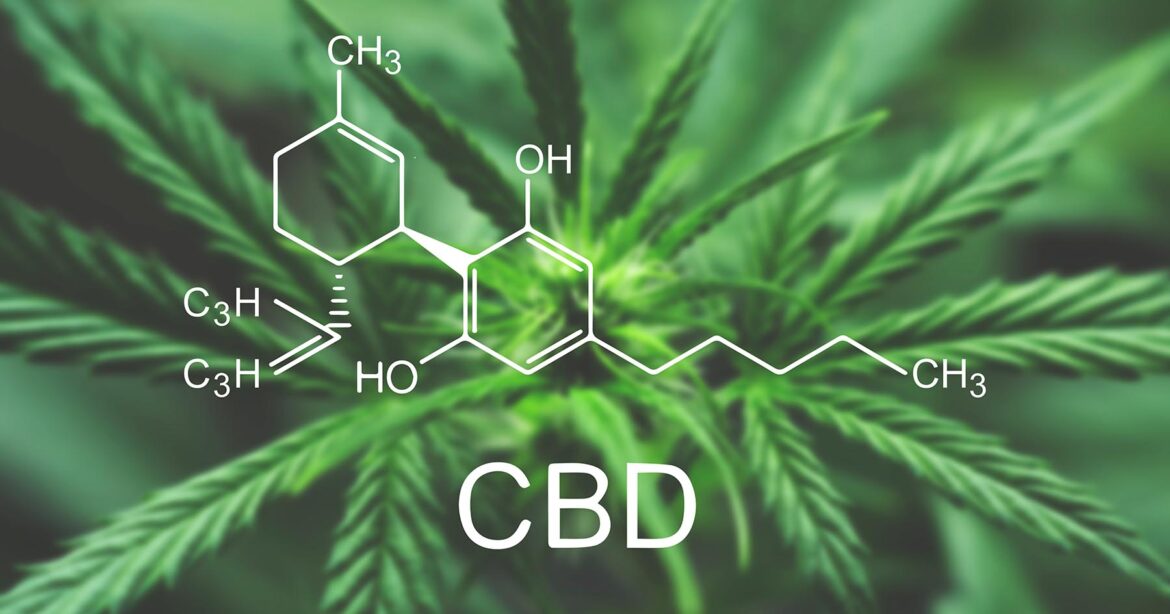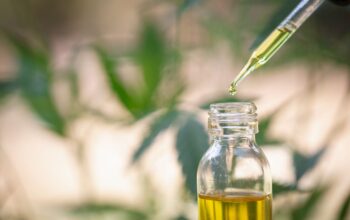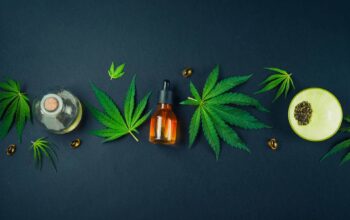CBD is an extract of the cannabis plant, and it is one of the 113 cannabinoids found in the plant. Cannabidiol is known as a non-psychoactive component of the plant, and it accounts for about 40% of the extract’s total molecule. Since its discovery in 1940, cannabidiol has been proven to have therapeutic effects on pain, depression, inflammation and more.
Also Read: 4 Benefits Of Using CBD Oil
Cannabidiol
Cannabidiol (CBD) is a chemical compound found in the cannabis plant. This compound isn’t psychoactive, but it does have some medicinal benefits. It’s been studied for a variety of different uses. For instance, it may be able to alleviate pain and reduce inflammation. But more research is necessary to determine its effectiveness.
CBD is just one of hundreds of compounds found in the cannabis plant. Other notable ones include cannabidiolic acid, cannabichromenic acid, and cannabigerolic acid. One of these, delta-9 tetrahydrocannabinol, is the primary active ingredient in marijuana, and it is also the reason for its name.
A lot of research has been devoted to the effects of cannabidiol on human health. Studies have shown that it is a promising anti-seizure medication. In fact, the FDA has approved it to treat two rare types of childhood epilepsy.
However, it is not the most efficacious of the cannabinoids in the pharmacopoeia. The best evidence is in the number of people who have reported positive results, but not all users are the same. Some studies show that it may improve dystonia by as much as 20% to 50%.
The real magic of cannabidiol is in its ability to induce a number of other tinier benefits. For instance, it can inhibit schizophrenia-like behaviours in AMPH-sensitised rats. It also has the power to make a morning coffee taste better. Another benefit of cannabidiol is that it can be used to make CBD infused sports bras. These products have become popular among consumers looking to enhance their workout or relax after a hard day at the office.
There is also a plethora of products on the market infused with this chemical compound, including gummies, drinks, and even facials.
Endocannabinoid system
The endocannabinoid system is one of the most important systems in the body. It enables the body to maintain homeostasis. This includes regulating the immune, digestive, and nervous systems. Among its many functions, it also has a significant effect on the feeling of pain.
Endocannabinoids are naturally produced by human cells. These molecules are similar to serotonin and modulate various activities of the body, such as mood and memory. They are made from fat-like molecules that are present in the membranes of cell. When they are needed, they are activated, and they send messages to various parts of the body. Once they are deactivated, enzymes break them down.
One of the key players in the endocannabinoid system are cannabinoid receptors. They are present on the surface of cells, and they receive signals from the brain and the immune system. There are two types of cannabinoid receptors: CB1 and CB2. Both are found on the brain and other parts of the body. However, the CB1 receptors are more widespread in the brain and central nervous system.
Cannabinoids are also used to treat nausea and to relieve pain. Using cannabinoids can reduce the feeling of chronic pain, such as fibromyalgia. In addition, they can increase appetite and regulate sleep. Various studies have shown that cannabinoids can decrease cravings in abstinent drug users.
Research has indicated that cannabinoids may be effective in treating chronic pain and depression. Cannabinoids can reduce anxiety and stress by acting on the neurotransmitters dopamine and serotonin. Other research has indicated that cannabinoids may affect the amygdala, which is involved in negative emotional processing. Moreover, they can also reduce the occurrence of migraines.
Cannabinoid receptors
Cannabinoid receptors are one of the most common neurotransmission systems in the body. These receptors are found throughout the body, including in the brain, the immune system, and the peripheral organs. They are involved in several functions of the human body, including appetite, mood, memory, pain, and more.
The endocannabinoid system is a network of chemical messengers that interact with cannabinoid receptors. It has been discovered that the endocannabinoid system has many functions, including regulating the body’s lipid metabolism. In addition, it has been implicated in nociception, a process that involves sending and receiving messages between the nervous system and the body’s internal environment.
Endocannabinoids are natural compounds that the brain naturally produces. These compounds work through ionotropic cannabinoid receptors to affect various bodily functions. For example, they can influence the migration of endothelial cells and the formation of blood vessels. Aside from these functions, endocannabinoids are also responsible for appetite, reproduction, and mood.
The two main types of cannabinoid receptors are CB1 and CB2. Although they are both located in the central and peripheral nervous systems, they work differently. One type, CB1 receptors, are found primarily in the brain, while the other is found mainly in the immune system. Interestingly, they share the same effect, a local analgesic.
THC, the psychoactive phytocannabinoid, activates CB1 and CB2 receptors. However, CBD is a non-intoxicating cannabinoid. Moreover, its mechanism of action is different from that of THC.
Cannabinoid receptors can be used in therapeutics as an anti-inflammatory agent, a pain reliever, and an anti-emetic. Several clinical trials have examined cannabinoids for their effects on a variety of diseases.
In addition to these medical applications, research is being conducted to develop more effective ways of delivering cannabinoids. Transdermal cannabinoids are a promising treatment, as they can penetrate the skin and target painful and inflammatory conditions.
Treatments for chronic pain, inflammation, depression and other conditions
CBD is a cannabinoid that is extracted from the marijuana plant. It has several benefits including pain relief, anxiety, depression, inflammation, and stress. However, there is a need for more well-designed clinical trials to evaluate its therapeutic properties.
THC/CBD combination medicines are new approaches to chronic pain, depression, and stress. They have a positive safety profile and negligible dependence. These drugs are appropriate for patients with moderate to severe chronic pain who are unable to tolerate opioid analgesics. They also have a limited potential for abuse.
Although THC/CBD combination medicines have a promising safety profile, they should be used with caution. This includes the possibility of increased heart rate and oxygen demand, which can be dangerous in patients with cardiovascular disease. Additionally, these drugs may exacerbate psychosis in some patients.
CBD has been shown to act as an antidepressant. In addition, its mechanism of action is still not clear. However, a number of studies suggest that CBD interacts with the CB1 and CB2 receptors in the brain. Moreover, CBD inhibits the FAAH enzyme, which breaks down the neurotransmitter anandamide.
CBD also acts as an inhibitor of TNF-a and IFN-g. These substances are produced by the body as a result of stress. Chronic stress is a contributor to many diseases. There are also substantial economic losses associated with chronic stress. Therefore, a therapeutic target for reducing its impact is important.
A panel of 20 experts recommended that CBD should be considered as a treatment for neuropathic pain and nociceptive pain. In addition, they suggested that CBD-only medicines should be used as a treatment for stress.
There is a need for more research on the effectiveness of low-dose CBD for patients with chronic pain, inflammation, and depression. The results of the clinical trials thus far suggest that CBD could be a viable alternative for the treatment of a variety of disorders.
CBD has legal status in all 50 states
CBD is a booming industry that continues to make waves in the United States and abroad. However, the legal status of CBD varies from state to state. While some states allow for the use of CBD-infused edibles, others have a stricter stance. If you are planning to relocate to a state with a less-lenient stance, be sure to do your research.
There are many legalities to consider. The FDA has some important requirements to keep in mind when evaluating the legality of a particular product. It is also a good idea to check with your local government before making a purchase.
The FDA has a number of resources to help you learn more about the various cannabis products. In addition, the agency enforces federally enforced controlled substance laws. This includes laws on marijuana and hemp.
The Farm Bill of 2018 made the legalization of industrial hemp a real possibility. As a result, the availability of legally produced CBD will increase. Some states will even honor the new hemp-derived CBD products.
However, some states will still prohibit the sale of CBD-infused edibles. Other states will require that you have medical approval before you can make the purchase.
It’s hard to tell which states will be the first to legalize the sale of cannabis-derived CBD. Currently, the only FDA-approved product is Epidiolex, a pharmaceutical drug that contains a purified form of the plant.
Although the FDA hasn’t issued any official statements about CBD, it is clear that the agency is concerned with the proliferation of the substance. To keep consumers safe, the agency will likely have its say in the form of regulation and enforcement.




